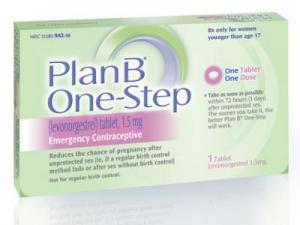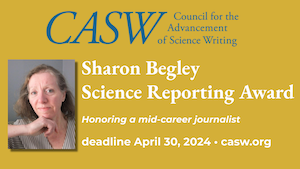PANDORA'S PILLBOX. The morning-after pill story gets weirder.
A Federal appeals court has just ruled that the generic two-step version of the Plan B emergency contraceptive can be sold without prescription and, importantly, without age restrictions. But the ruling left Plan B One-Step still in legal limbo.
That's because the Feds are appealing a New York court's decision that One-Step should be sold without restrictions. Deborah Kotz explains the tangled history at Daily Dose (registration required). At Shots, Julie Rovner provides some history too, and suggests that the decision could finally end up in the lap of a US Supreme Court justice: Ruth Bader Ginsburg. Whooeee!
The generic morning-after contraception, called Next Choice, consists of two pills to be taken 12 hours apart. Last month the FDA ruled that the two-step product must be kept behind the pharmacist's counter and sold only to those 17 and older — but Plan B One-Step should be on open shelves next to condoms and tampons and sold to 15-year-olds who provide proof of age. The reasoning was that the two-step product might overtax the planning abilities of bubbleheaded teens, so they would be better off with One-Step.
Not an irrational decision, I guess, since said teens would by definition be so bubbleheaded that they risked unprotected sex. The Emergency Contraception web site, though, says the two pills can actually be taken together.
The Emergency Contraception site is operated jointly by the Office of Population Research at Princeton University and the Association of Reproductive Health Professionals. That's some powerful backing, and suggests authoritatively that two-pill Next Choice, which is cheaper than Plan B, is functionally equivalent to it. At Shots, Julie Rovner says
Plan B One-Step costs in the neighborhood of $50 , while the generic two-pill formulations cost about $20-$35.
Until I read Rovner's post, I'd never heard of the Emergency Contraception site, which is extraordinarily helpful, and should be better known. Spread the word. It has an alternate URL: not-2-late.com. Which says it all.
LET'S RUN HESTER PRYNNE OUT OF THE INSURANCE POOL. Yes, yes, the convoluted rulings on the morning-after pill are weird. But then the whole topic of birth control is weird, very weird. At the Health Care Blog, J.D. Kleinke reports that the Obamacare provision requiring that women must have access to free preventive care that includes contraception has gotten 147,000 comments from the public, "more than on any other regulatory ruling, on any subject, in the history of the nation. Really." Most, of course, are opposed.
The reason, he declares in this eloquent post, is that the health care system is a dumping ground for all of society's hot-button issues. I am tempted to quote from his analysis at length, but the topic here is sex, so I will limit myself to this:
Abortion jumps out of Pandora’s pillbox first because the country has been engaged in a civil war over it — and not always just a cold civil war — for half a century. But contraception? One of the best ways to reduce abortion rates?? 147,000 comments??? By contrast and for some odd reason, there has been almost no public discussion of Obamacare’s coverage of vasectomy, the single most effective form of birth control. Which leads one to believe that this particular debate is less about abortion — or even sex-for-fun, as enabled by vasectomy — than about something else that apparently belongs on the list of unresolved cultural arguments: female sexual autonomy.
Laura Newman could not agree more. In a a post at Patient POV, she notes the recent successful campaign to get Facebook to crack down on gender-based hate speech and urges more such campaigns aimed at access to contraception and reproductive care. She declares
[A] separate, discriminatory standard of health care for pregnant women is expanding rapidly across the United States. Our elected officials must be held accountable.
SPEAKING OF UNPROTECTED SEX, AS MICHAEL DOUGLAS WAS. I guess we should all thank Michael Douglas for raising public awareness of the major cause of throat cancer, the human papilloma virus — and in particular for emphasizing that a vaccine can prevent infection. Also, in case you have been napping on an exoplanet and didn't hear the news, that HPV can be transmitted via oral sex.
Once more, see Deborah Kotz at Daily Dose, who explains what is known about the risks for throat cancer from oral sex. Although smoking and alcohol are risk factors too, about 70% of the 14,000 annual US throat cancers are due to HPV infection (registration required). Her sources tell her those cancers were virtually unknown 15 years ago.
The cause is not completely clear. It's possible the virus has evolved and adapted to grow well on oral tissues. It's also possible there's been a big increase in oral sex. Or both.
The good news, according to Bahar Gholipour at LiveScience, is that patients with HPV-positive tumors do better than patients whose tumors are HPV-negative. They respond better to treatment and have a higher survival rate. Douglas is a poster child for that, too.
The bad news is that not nearly enough kids are getting the HPV vaccine, although it has long been known that HPV causes nearly all cervical cancer. Vaccinations should take place in the early teens, before sexual contacts begin, and that has made HPV vaccination particularly controversial. Kotz reports that in Massachusetts, one of the more health-conscious states, only 47% of young girls have undergone the full series of 3 vaccinations required for full protection against HPV. A couple of years ago, CDC recommended that boys should get the vaccine too. Perhaps Douglas's example will encourage that.
AN ETYMOLOGICAL ASIDE. Those of us who write should also thank Douglas for providing an opportunity to use the word cunnilingus without apology. It's a bit puzzling that the word fellatio doesn't seem to have popped up in these discussions, since the act is yet another way of transmitting HPV orally. Is that sexism? And, if so, of what kind? Is there a connection here with Kleinke's observation, noted above, that the birth control wars for some reason ignore vasectomy?
The fact that the terms cunnilingus and fellatio seem to be Latin helps us to maintain an oh-so-serious mien while trying to hide our childish glee at using naughty words. In public! Being Latin takes a bit of the edge off. Makes them more respectable. Classical even. Although see below; they aren't, really.
I confess that, being a convent-educated good girl, I am somewhat more uncomfortable at the idea of using the everyday English equivalent terms here, despite their ubiquity on TV, on the street, and in the corridors of power. Odd, really. Or maybe not. Latin is a foreign, uh, tongue, and a dead one at that. Hiding behind it makes a writer seem cultivated and refined while ensuring that the cognoscenti — the people we're really writing for — will get it.
Cognoscenti, by the way, is not a true Latin word. The Oxford folk say it's an 18th-century Latinized version of an Italian word, conoscenti, meaning "people who know." It appears that cunnilingus and fellatio fail to qualify as real Latin as well. They are derived from Latin words, but Oxford says they originated in the 19th century. So, not Latin. Latinate. Does that make them less usable as a shield for propriety?
THIS IS ABOUT SEX TOO. Do you believe that more than a third of recent marriages began online? Neither do I, but that's what a paper in the illustrious Proceedings of the National Academy of Sciences is claiming. It also claims that couples who met online are somewhat less likely to be separated or divorced than couples who met face-to-face.
Knight Science Journalism tracker Faye Flam shares my skepticism, pointing out that despite its august placement, the study was funded by that heavily advertised dating site eHarmony and the lead author is one of its scientific advisers. In fact, many of the media appraisals of the study have noted the eHarmony connection.
In her post at Streams of Consciousness, Ingrid Wickelgren explores that connection with the lead author, a social scientist on the eHarmony advisory board, who describes the steps he took to ensure the study's scientific validity. He notes that the government funds few studies of love, marriage, and relationships, so industry may be the underwriter of last resort.
The couples in the study who met online got together in person, of course, before getting together maritally. So in a sense, marrying someone you meet online may not differ much from marrying someone you meet in any other way. I am reminded of the fact that although I married a man I had met face-to-face and known for 18 months, owing to geography and other obligations we had spent only a couple of dozen days together during that time.
We wrote letters every day, sometimes oftener, and talked on the phone when we could afford it — this being some decades before email and cellphone contracts. Not substantially different, I guess, from a courtship partly online. And here we still are, a great many years later. He just fixed me dinner, and then we went outdoors and watched the Space Station twinkle by.
It would be good to hear from a blogger who married as a result of online meeting, and indeed there is such a perfect person: Virginia Hughes, who blogs at Only Human. A year ago she married a guy she met through the dating service Match.com. She thinks online exchanges help reveal attitudes and values of a prospective mate more accurately than face-to-face encounters.
Research has shown, she says, that people tend to reveal authentic information about themselves online. I haven't read the research, and will take her word for it — provisionally. But I can't help remembering that classic New Yorker cartoon by Peter Steiner:. You know the one: A dog at the computer to another standing by: "On the Internet, nobody knows you're a dog."
A WORD ABOUT SEXUAL ORIENTATION. It wouldn't be a blog post about sex without a word about sexual orientation. And this one — actually a video, not just a word — is pretty astonishing.
At Science Careers, Beryl Benderly tells of a NASA video created by the Out and Allied Employee Resource Group at the Johnson Space Center. Posted there and on YouTube, the video is aimed at "high school and college-aged lesbian, gay, bisexual, transgender, queer and questioning (LGBTQ) individuals" who have been bullied. The message is "It gets better."
Viewers are also assured that NASA welcomes all who are skilled and talented, regardless of sexual orientation. Let us hope this does not prompt the sex-biased bullies to yell, "That's right, send all them !@#$~^% folks to Mars!"




.png)

